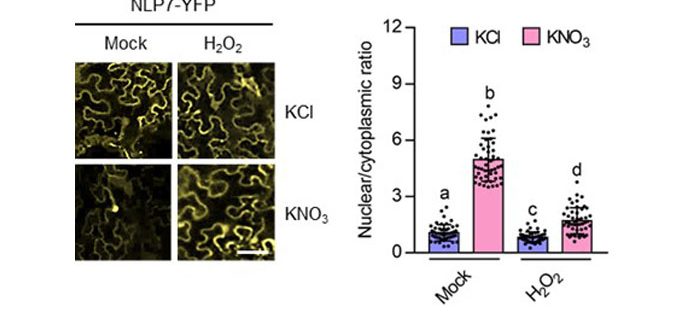ROS inhibit nitrate signaling
Chu et al. demonstrate that H2O2 inhibits the nitrate-promoted nuclear localization of NLP7 in plants. Plant Cell https://doi.org/10.1093/plcell/koab165
By XiaoQian Chu, Jia-Gang Wang and Ming-Yi Bai
Background: Nitrate is both an essential macronutrient for plants and a critical signaling molecule that regulates plant metabolism, growth, and crop yield. Reactive oxygen species (ROS), as the by-products of aerobic metabolism, initially studied in relation to their damaging effects, have emerged as major regulators of plant growth and development, as well as plant responses to stress. Deprivation of nitrogen triggers the accumulation of ROS. The inhibition of ROS accumulation by chemical agents blocked the induction of gene expression associated with the nitrate-starvation response. However, the interplay between nitrate and ROS signaling in plant development remains unclear.
Question: Do ROS affect the nitrate signal transduction in plants? We tested this by analyzing nitrate-regulated gene expression and plant growth in the presence or absence of ROS.
Findings: We found that the growth-related transcription factor HBI1 is rapidly induced by nitrate through NLP6 and NLP7, which are master regulators of nitrate signaling pathway. HBI1 increases the expression levels of a set of antioxidant genes to reduce the ROS in plants. Treatment with hydrogen peroxide (H2O2), an important ROS signaling molecule, suppresses the nitrate-stimulated plant growth and downstream gene expression. Nitrate supply induces the nuclear localization of NLP7, whereas such promoting effects of nitrate are significantly impaired in mutants of hbi-q and cat2 cat3 that accumulate high levels of ROS. Overall, our findings reveal that nitrate treatment reduces the accumulation of ROS, and ROS inhibits nitrate signaling, thereby forming a feedback regulatory loop to regulate plant growth and development.
Next steps: When plants are grown under the biotic or abiotic stress conditions, nitrate signaling is significantly inhibited and nitrogen use efficiency is reduced. Adequate regulation of the activity of key components in the nitrate signaling pathway will help to improve plant tolerance to different stress conditions.
Xiaoqian Chu, Jia-Gang Wang, Mingzhe Li, Shujuan Zhang, Yangyang Gao, Min Fan, Chao Han, Fengning Xiang, Genying Li, Yong Wang, Xiang Yu, Cheng-Bin Xiang and Ming-Yi Bai. (2021). HBI Transcription Factor-Mediated ROS Homeostasis Regulates Nitrate Signal Transduction. Plant Cell. https://doi.org/10.1093/plcell/koab165




